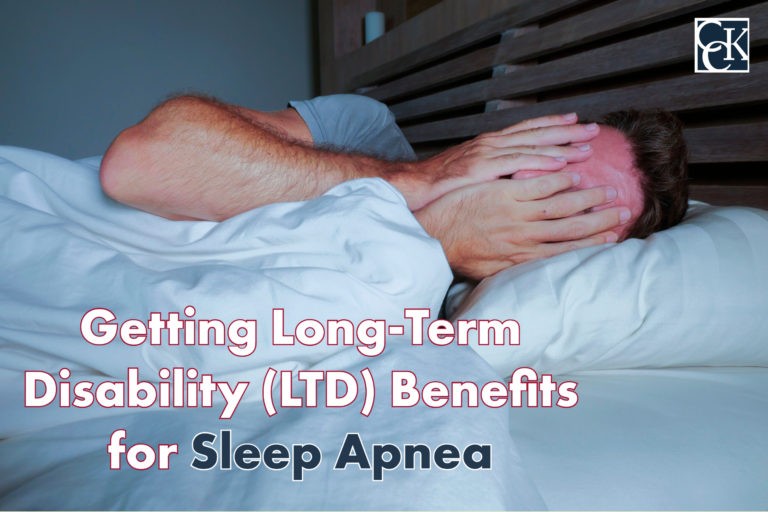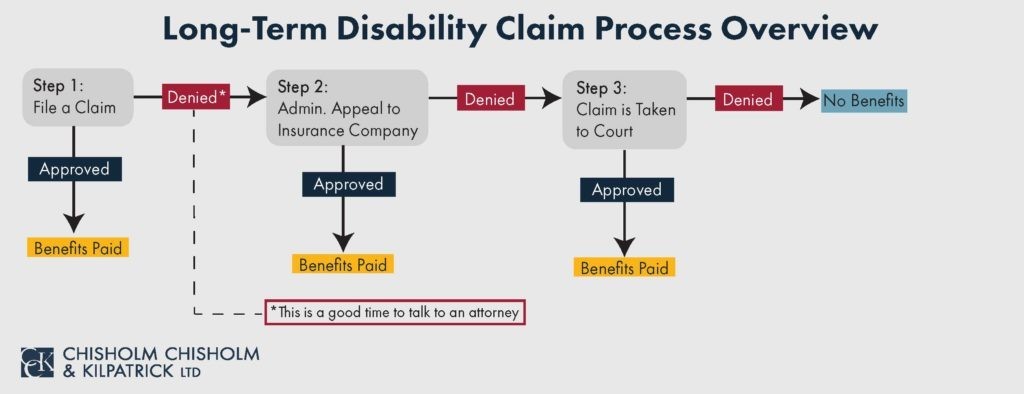Getting Long-Term Disability (LTD) Benefits for Sleep Apnea

Sleep apnea is a common disorder that affects how a person breathes while they are sleeping. A person who suffers from sleep apnea will repeatedly stop breathing during sleep. If undiagnosed, this condition is potentially dangerous and can affect both your physical and your mental well-being.
When this condition impacts your ability to work, you may be eligible to apply for long-term disability (LTD) benefits. The long-term disability lawyers at Chisholm Chisholm & Kilpatrick understand that filing a claim or appealing a denial of LTD benefits for sleep apnea can be challenging. Contact us today at (800) 544-9144 for a free consultation and see how we can help you.
An Overview of Sleep Apnea
Sleep apnea affects between 2 and 9 percent of adults in the United States. However, this condition often goes undiagnosed, so these numbers are potentially much higher.

There are three types of sleep apnea, each of which is unique and has different defining characteristics.
- Obstructive Sleep Apnea (OSA): This type affects the airways located in the back of throat. The airways become physically blocked, causing a person to temporarily stop breathing while they are sleeping.
- Central Sleep Apnea (CSA): This type occurs because of an issue with the brain’s ability to control the muscles involved in breathing. The result is that a person has shallower and slower breathing patterns.
- Mixed Sleep Apnea, or “Complex Sleep Apnea”: It is possible for a person to have both OSA and CSA simultaneously. When this happens, they have what is known as “mixed sleep apnea,” which is sometimes referred to as “complex sleep apnea.”
Of the people who suffer from this condition in the United States, most suffer from obstructive sleep apnea. It is common for people with this condition to feel sleepy during the day, lack focus and concentration, and feel rundown. It is difficult to function during the day when your sleep is heavily disrupted.
While there is no direct cause of sleep apnea, several factors raise the possibility of a person developing the condition. These causes can include obesity; the use of alcohol; smoking; congestion; anatomical issues involving the neck and jaw area of a person; and sleeping on one’s back.
The above-mentioned causes are associated with OSA. CSA’s underlying causes usually stem from a medical issue, such as a stroke or brain infection. Consequently, one major risk of CSA is heart failure.
Nevertheless, it is essential to have a doctor diagnose your condition. Undiagnosed sleep apnea can lead to a range of dangerous complications, e.g., “heart attack, glaucoma, diabetes, cancer, and cognitive and behavioral disorders.”
Symptoms of Sleep Apnea
The three types of sleep apnea, while different, do share some of the same symptoms, including disrupted sleep; excessive daytime sleepiness (EDS); headaches; and a diminished attention span and lack of focus.
The most common symptom of OSA is snoring. Sufferers of CSA rarely exhibit snoring as a symptom. OSA sufferers may also experience sore and dry throats upon waking. They may also suffer from nocturia, which is the constant urge to wake up and urinate.
Sleep Apnea Diagnosis
Often, you need to relate your sleeping issues to your doctor. Since excessive daytime sleepiness is normally the only symptom you notice on your own, having statements from someone who shares your bed or household is vital in showing the extent of your issue with your doctor.

If your doctor believes something is amiss with your sleep, they will refer you to a sleep specialist. Often, they will administer a test called nocturnal polysomnography, which monitors you as you sleep.
Sometimes your sleep specialist will administer home tests that monitor the same vitals as a nocturnal polysomnography. Regardless of the test you take, it will monitor your heart, brain, lungs, breathing, and blood oxygen levels.
For OSA sufferers, your sleep specialist may refer you to an ear, nose, and throat doctor. For CSA sufferers, your sleep specialist may refer you to a cardiologist or a neurologist for further evaluation.
Sleep Apnea Treatment
There are various treatments available for this condition. However, none of these treatments will “cure” the condition. Your doctor may recommend some of the following treatments:
- Lifestyle changes, such as losing weight or cutting down on alcohol and tobacco;
- A continuous positive airway pressure (CPAP), which is a device that is strapped to the head while the person sleeps and regulates the air pressure around the nose to open the nasal passages;
- Oral appliances that shift your jaw forward to open your throat while you sleep; and
- Supplemental oxygen used at night (usually used for CSA sufferers).
Some treatments, such as a CPAP, are invasive and uncomfortable. Speaking with your doctor will help you find the method that works best for you.
Sleep Apnea and Your Long-Term Disability Claim
As mentioned, this condition can lead to many dangerous complications and can greatly impact a person’s quality of life. Sleep apnea can negatively impact your ability to work. Likewise, it can make everyday tasks seem like a burden. If your condition is affecting you at work, you may want to file a long-term disability claim.
While the Social Security Administration (SSA) does not list sleep apnea as a qualifying disability, they do have listings for breathing and heart problems. Regardless, this does not mean you cannot file a claim. In your claim, it is crucial to include all evidence that proves your disability according to the definition defined in your long-term disability policy.

How Chisholm Chisholm & Kilpatrick Can Help
The legal team at Chisholm Chisholm & Kilpatrick understands that filing a long-term disability claim when you suffer from sleep apnea is difficult. If you need help filing an initial claim or appealing a denial of benefits, we want to assist you.
Our long-term disability lawyers will review your LTD policy in its entirety. Your policy includes a lot of important information, such as what your insurance company defines as a disability. You must prove that you meet this definition to receive benefits. Our legal team will gather the best evidence to submit to prove your disability.
Additionally, we will help you connect with outside experts who can perform supplemental evaluations that can bolster your claim. A vocational expert, for example, can evaluate how your sleep apnea directly affects your ability to adequately do your job.
CCK lawyers are also well-versed in ERISA law. ERISA law governs group policies. It is sometimes difficult to navigate ERISA laws, but our attorneys have extensive experience and can assist you. If your case goes to litigation, our legal team will ensure everything is submitted in a timely manner.
At Chisholm Chisholm & Kilpatrick we understand that suffering from sleep apnea is draining, both emotionally and physically. We want you to focus on your health. We want to ease the stress of filing a claim. You are entitled to certain benefits, and we want to make sure you get them. Call us today at (800) 544-9144 today for a free consultation to see how we can help you.

Share this Post